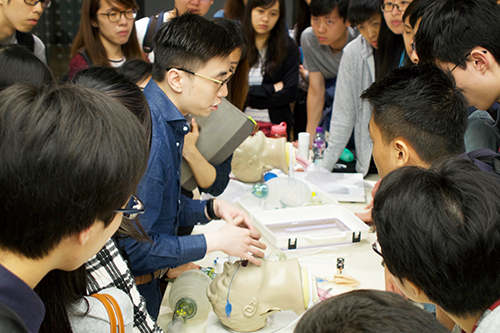Research
The research focus of the Department of Emergency Medicine include:Department of Emergency Medicine Research
HKUMed’s Department of Emergency Medicine research interests include biomarker discovery, clinical applications and clinical trials. We aim to become a world leading, biomedical, translational research facility, renowned for addressing the grand challenges of this age in acute illness and injury.
For over 25 years members of our group have been studying potential applications of liquid biopsy nucleic acids and proteomics as early molecular biomarkers and diagnostics in acute conditions. We have previously made discoveries in circulating DNA, mRNA and miRNAs for early detection and prognosis in trauma, stroke, acute coronary syndrome and acute appendicitis. We were the first to characterise the early and late changes in circulating nucleic acids in trauma, stroke, acute coronary syndrome and the acute abdomen and to present their diagnostic and prognostic potential. For example, we showed that plasma DNA is elevated within an hour of trauma and that these changes predicted multiple organ failure and mortality and remained elevated for days. We have also investigated real world applications of important proteins and their applications in infectious disease.
Specifically, our team of clinical and laboratory scientists, staff and students collaborate locally and internationally on the translational continuum of discovery, utility, implementation and public health impact in sepsis, infectious diseases and stroke. The scope of our work covers the spectrum from biomolecular discoveries and mechanisms of disease through to clinical utility and economic benefits. We include basic science research with clinical studies and trials in our search for answers to today’s challenges.
The University of Hong Kong has world-class facilities for Omics research which are available for hospital front door, translational investigations.

Translational Studies and Mechanisms Of Disease In Sepsis
Our research programmes focus on understanding mechanisms of disease, molecular Omics and immunology of sepsis and infectious diseases. Our discoveries will lead to applications in molecular classification, screening, prevention, detection, diagnostics, prognostics and therapeutics.
We plan to perform comprehensive molecular profiling and integrative genomic and immunological studies on a large series of patients with infectious diseases and sepsis. We will develop and validate pathways using next-generation sequencing, expression microarray, methylation array and DNA SNP genotyping array. The discovery of novel biomarkers using slow, complex biotechnology may then be evaluated for rapid point of care tests.
This new initiative is seeking Theme-Based Research Scheme (TBRS) funding, angel investors as well as partnerships with major pharmaceutical and diagnostic companies.
Translational Studies and Mechanisms Of Disease In Stroke
Our research programme focuses on early biomarker discoveries in Stroke in the emergency department. An understanding of the molecular Omics and immunology of stroke will lead to applications in molecular classification, screening, prevention, detection, diagnostics, prognostics and therapeutics.
Our team in Hong Kong will pioneer a translational programme focusing on the potential for circulating biomarkers as diagnostic and prognostic markers in patients with stroke.
We plan to perform comprehensive molecular profiling, integrative omics and immunological studies on patients with stroke and to develop and validate pathways using Omics approaches. The discovery of novel biomarkers using biotechnology may then be evaluated for rapid point of care tests.
Clinical Toxicology
Our Unit works closely with the Toxicology Teams and chemical pathologists of Queen Mary Hospital, the Hong Kong Poison Information Centre, as well as the Toxicology Reference Laboratory of the Hospital Authority. The collaboration has led to the discovery of poisonings that were caused by novel substances of abuse in our region, such as methoxphenidine (a dissociative agent), AB-FUBINACA and ADB-FUBINACA (synthetic cannabinoids), and a few herb-related toxicities never been reported in the literature. A novel pathomechanism is proposed following prolonged exposure of silver. Multiple research projects are ongoing to explore recreational drug toxicities and Chinese medicine poisoning presenting to the emergency departments in Hong Kong.



